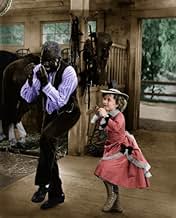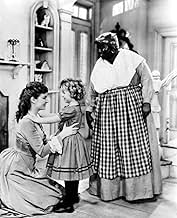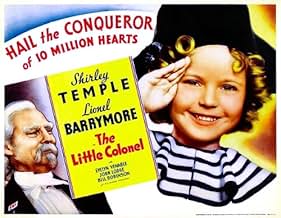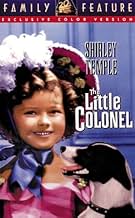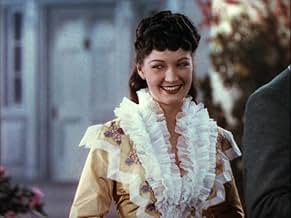In the post-Civil war south, a darling little girl attempts to restore the peace between her parents and her plantation owner grandfather.In the post-Civil war south, a darling little girl attempts to restore the peace between her parents and her plantation owner grandfather.In the post-Civil war south, a darling little girl attempts to restore the peace between her parents and her plantation owner grandfather.
- Director
- Writers
- Stars
- Awards
- 2 wins & 1 nomination total
Stephen Chase
- Hull
- (as Alden Chase)
C.E. Anderson
- Overseer
- (uncredited)
Martin Faust
- Frontiersman
- (uncredited)
Rolland Hamblen
- Trooper Doing Egg Trick
- (uncredited)
Frank Hammond
- Carriage Driver
- (uncredited)
- Director
- Writers
- All cast & crew
- Production, box office & more at IMDbPro
7.02K
1
2
3
4
5
6
7
8
9
10
Featured reviews
Okay, But Weaker Of Two Civil War Efforts Of 1935
It's odd that Shirley Temple made two similar movies in the same year, both involving Civil War-type story lines and her character being very similar. "The Littlest Rebel" took place during the Civil War and "The Little Colonel" took place right after the war.
For some reason, I get an extra feeling being choked up seeing Shirley melting a crabby old man's heart as she did in some of her films, this being one of them. Here, it's Lionel Barrymore who was fun to watch in any film.
The lead female role was played by Evelyn Venable and she really wasn't up to the standards, beauty-wise, set by previous Temple adult feminine leads such s Gloria Stuart, Karen Moreley, Rochelle Hudson, etc. But, that's not important.
The story was more important and in case - surprise - I found this to run a distant second to the aforementioned "The Littlest Rebel." This movie was, frankly, boring in comparison.
I am not one of the crying Liberals who boycott Temple''s films because blacks in these movies were denigrated. Unfortunately, that's what you saw in 1930s films....and what's done is done. However, the black characters in here are just plain treated embarrassingly bad. Everyone's Mr. Nice Guy (mine, too) Bill Robinson, didn't come on the scene and dance with Shirley until later in the film when I had lost interest.
Temple, meanwhile, is so cute that she's even likable when she's a brat, as she acts several times with the old man (but apologizes later for her behavior).
It's still a good film but I prefer the "Rebel" over the "Colonel" in the battle of these 1935 Civil War-themed stories.
For some reason, I get an extra feeling being choked up seeing Shirley melting a crabby old man's heart as she did in some of her films, this being one of them. Here, it's Lionel Barrymore who was fun to watch in any film.
The lead female role was played by Evelyn Venable and she really wasn't up to the standards, beauty-wise, set by previous Temple adult feminine leads such s Gloria Stuart, Karen Moreley, Rochelle Hudson, etc. But, that's not important.
The story was more important and in case - surprise - I found this to run a distant second to the aforementioned "The Littlest Rebel." This movie was, frankly, boring in comparison.
I am not one of the crying Liberals who boycott Temple''s films because blacks in these movies were denigrated. Unfortunately, that's what you saw in 1930s films....and what's done is done. However, the black characters in here are just plain treated embarrassingly bad. Everyone's Mr. Nice Guy (mine, too) Bill Robinson, didn't come on the scene and dance with Shirley until later in the film when I had lost interest.
Temple, meanwhile, is so cute that she's even likable when she's a brat, as she acts several times with the old man (but apologizes later for her behavior).
It's still a good film but I prefer the "Rebel" over the "Colonel" in the battle of these 1935 Civil War-themed stories.
anthology
I grew up with Shirley Temple. In 1932 she made 12 movies as an adorable baby doll of four years old. In 1933 she made four films; in 1934 eleven films the best was "Stand Up & Cheer" and "Baby, Take A Bow". In 1935 four films; in 1936 Captain January", in 1937 "Heidi"; in 1938 "Rebecca of Sunnybrook Farm" and "The Little Princess". In 1940 two movies, and in 1941 her first flop. 1944 she made a comeback in "Since You Went Away" and "I'll Be Seeing You". 1947 she made three films including "Bachelor & the Bobby Soxer". 1948 "Fort Apache" when she met her first husband John Agar. In 1949 she made four good films the best of which was "A Kiss for Corliss". Nobody wanted little Shirley to grow up, so I must say my favorite film of hers was "The Little Colonel" in which she sang and danced so well with the famed Bill Robinson. In that film she played against the great Lionel Barrymore.
The Last Stand of the Old South
America's favorite moppet Shirley Temple may have met her match in scene stealing with Lionel Barrymore playing her grandfather. Just watching Barrymore taking back his scenes from Temple makes The Little Colonel an enjoyable film to watch.
Barrymore complete with white suit, Panatella, and goatee with long white hair looks like the spitting image of Colonel Sanders. He's one reconstructed old rebel and what Lee and Grant signed at Appomattox has no bearing on him. All he has to hear is that his daughter Evelyn Venable has taken unto herself a Yankee for a husband and he disowns her. So she and John Davis Lodge go first north and west and have themselves a daughter.
When Lodge goes into the west with a couple of shifty partners in a prospecting deal, he sends Venable and the little girl they have now back south to live with grandfather. Well kind of, as they take a gate cottage to live in.
But as these Shirley Temple movies go, you know it's Shirley who brings all the warring parties together. Who could resist.
The Little Colonel is known for that famous dance that Bill Robinson does with Shirley Temple on the staircase. It's still as entertaining as it ever was. The last couple of minutes are in color in which all the principal players appeared in that for the first time.
The scenes with Barrymore and Temple are absolutely precious. Just who was the best capturer of the audience's attention. Judge for yourself.
Barrymore complete with white suit, Panatella, and goatee with long white hair looks like the spitting image of Colonel Sanders. He's one reconstructed old rebel and what Lee and Grant signed at Appomattox has no bearing on him. All he has to hear is that his daughter Evelyn Venable has taken unto herself a Yankee for a husband and he disowns her. So she and John Davis Lodge go first north and west and have themselves a daughter.
When Lodge goes into the west with a couple of shifty partners in a prospecting deal, he sends Venable and the little girl they have now back south to live with grandfather. Well kind of, as they take a gate cottage to live in.
But as these Shirley Temple movies go, you know it's Shirley who brings all the warring parties together. Who could resist.
The Little Colonel is known for that famous dance that Bill Robinson does with Shirley Temple on the staircase. It's still as entertaining as it ever was. The last couple of minutes are in color in which all the principal players appeared in that for the first time.
The scenes with Barrymore and Temple are absolutely precious. Just who was the best capturer of the audience's attention. Judge for yourself.
The little colonel wins the heart of grandfather colonel
The opening scene of "The Little Colonel" is set somewhere in the Deep South in the 1870s. The Civil War had been over for years, but plantation owner, Colonel Lloyd, still carried a hatred for the Yankees. When his daughter, Elizabeth, plans to marry a man from the North, Jack Sherman, Lloyd disowns her. Segue to six years later, at an Army cavalry post somewhere in the Northwest, and a special formation has been called by Colonel Gray for the commissioning of a new officer. Six-year-old Lloyd Sherman is commissioned a colonel in the U. S. Army. She is the daughter of Jack and Elizabeth Sherman, and has endeared herself to the whole post.
So sets the stage for this movie that stars six-year-old Shirley Temple as Lloyd Sherman - that is, Colonel Lloyd Sherman. Lionel Barrymore plays her grandfather, Col. Lloyd, Evelyn Venable plays Elizabeth and John Lodge plays Jack Sherman. But the best of the supporting cast in this film - after Barrymore, are the black servants who have stayed on the Lloyd's plantation after the Civil War abolished slavery. Bill Robinson plays the colonel's butler, Walker, and Hattie McDaniel plays the cook, Mom Beck. They share of the singing and dancing with young Shirley that add the musical aspects to the comedy drama and family film.
Robinson's staircase dance routine is memorable, and one has to note that he was "no spring chicken" when this movie was made. Robinson was the same age as Barrymore, 57, with both actors having been borne in 1878. Barrymore had to don the white hair and beard to look older, and Robinson may have had some sprinkling of powder for the light touch of white in his hair. Robinson went by the nickname, Bojangles, and was one of the best tap dancers in the world. He started young and performed in vaudeville, on stage and in the movies. And, Hattie McDaniel would become the first African-American to win an Academy Award, in 1940. She won the best supporting actress for her role as Mammy, in the great 1939 production of "Gone With the Wind."
The plot for this film is a good story in which the young Colonel Lloyd Sherman resolves all the problems and disagreements and it ends happily for everyone - well, except for a couple of bad guys who, we assume get what's coming to 'em.
I enjoyed watching this film again - these many, many years after seeing it on late night TV in the 1950s-60s. And, this time in color. Here are a couple of favorite lines from the film.
Dr. Scott, "Marriage is a wonderful institution." Colonel Lloyd, "Yes, us, no family should be without it."
May Lily, "You can't be no colonel." Lloyd Sherman, "Why not?" May Lily, "Because you ain't got no whiskers." Lloyd Sherman, "I don't need to have whiskers. I've got a temper. That's all you need to be a colonel."
So sets the stage for this movie that stars six-year-old Shirley Temple as Lloyd Sherman - that is, Colonel Lloyd Sherman. Lionel Barrymore plays her grandfather, Col. Lloyd, Evelyn Venable plays Elizabeth and John Lodge plays Jack Sherman. But the best of the supporting cast in this film - after Barrymore, are the black servants who have stayed on the Lloyd's plantation after the Civil War abolished slavery. Bill Robinson plays the colonel's butler, Walker, and Hattie McDaniel plays the cook, Mom Beck. They share of the singing and dancing with young Shirley that add the musical aspects to the comedy drama and family film.
Robinson's staircase dance routine is memorable, and one has to note that he was "no spring chicken" when this movie was made. Robinson was the same age as Barrymore, 57, with both actors having been borne in 1878. Barrymore had to don the white hair and beard to look older, and Robinson may have had some sprinkling of powder for the light touch of white in his hair. Robinson went by the nickname, Bojangles, and was one of the best tap dancers in the world. He started young and performed in vaudeville, on stage and in the movies. And, Hattie McDaniel would become the first African-American to win an Academy Award, in 1940. She won the best supporting actress for her role as Mammy, in the great 1939 production of "Gone With the Wind."
The plot for this film is a good story in which the young Colonel Lloyd Sherman resolves all the problems and disagreements and it ends happily for everyone - well, except for a couple of bad guys who, we assume get what's coming to 'em.
I enjoyed watching this film again - these many, many years after seeing it on late night TV in the 1950s-60s. And, this time in color. Here are a couple of favorite lines from the film.
Dr. Scott, "Marriage is a wonderful institution." Colonel Lloyd, "Yes, us, no family should be without it."
May Lily, "You can't be no colonel." Lloyd Sherman, "Why not?" May Lily, "Because you ain't got no whiskers." Lloyd Sherman, "I don't need to have whiskers. I've got a temper. That's all you need to be a colonel."
The Lloyds' of Kentucky
THE LITTLE COLONEL (Fox, 1935), directed by David Butler, stars Shirley Temple in one of her more famous movie roles during her early years as a young performer. Aside from her initial teaming with legendary dancer Bill "Bojangles" Robinson (4th billed during opening credits, bottom billed in the closing), with whom she does a memorable "stair" dance, it places her against odds with the crusty Lionel Barrymore, on loan out assignment from MGM, sporting white hair, bushy eyebrows and droopy mustache in the old Southerner/ or Claude Gillingwater Sr. tradition, and what a pair they make.
Based on a story by Annie Fellows Johnston, the plot opens with a prologue set in 1870s Kentucky on a Southern plantation where Colonel Lloyd (Lionel Barrymore) disowns his beloved daughter, Elizabeth (Evelyn Venable) for eloping with a "Yankee", Jack Sherman (John Lodge). During their six years in Philadelphia, Jack and Elizabeth have been blessed with a child, Lloyd (Shirley Temple), whom they witness being commissioned as a "little colonel" by soldiers on a western outpost. With John remaining at the post, Elizabeth returns to Kentucky where she and Lloyd settle in an old cottage left to her by her late mother that happens to be next door to her father. After meeting his granddaughter with an introduction of getting mud thrown on him, he finds her to be just as stubborn and quick tempered as he. In spite of their rugged start and similar personality traits, Grandpa eventually warms up to Lloyd, though his stubbornness keeps him from having anything to do with his daughter, even when learning of swindlers Swazey (Sidney Blackmer) and Hull (Aden Chase) in their home threatening the ailing Jack and Elizabeth to turn over the deed to worthless property they sold him that has been proved valuable.
THE LITTLE COLONEL, a leisurely paced story with familiar theme, relies mostly on the strength of its leading players, Temple and Barrymore. It's also one of the better films in which Temple does not typically play an orphan. Evelyn Venable, whose career failed to take off after a promising start opposite Fredric March in DEATH TAKES A HOLIDAY (Paramount, 1934), provides the opening playing the harp and singing "Love's Young Dream" to her guests. The song is later reprized by Temple serenading to her grandfather as he envisions his daughter at the harp. John Lodge, virtually forgotten but better known for his performance as Count Alexi in THE SCARLET EMPRESS (Paramount, 1934) starring Marlene Dietrich, has little to do until the final half of the story. Hattie McDaniel, four years away her Academy Award winning performance in GONE WITH THE WIND (1939), supports as the Sherman maid, Mom Beck. Dressed in "Aunt Jemima" attire, she shares amusing moments with Colonel Lloyd's butler (Robinson), sharing time together with the "little colonel" at a spiritual gathering witnessing a woman getting dunked in the river where she's having her sins washed away as Negroes sing "The Sun Shines Brighter." Aside from the aforementioned "stair dance," Temple and Robinson do an encore tap dancing to Stephen Foster's "Oh, Susannah" in the stable to harmonica playing by May Lily (Avonne Johnson). Johnson, along with Nyamza Potts as her little brother, Henry Clay, support as Temple's playmates. As in many Temple films, there's a pet dog, this time a pooch named Fritzi. Others in the cast include William Burress (Doctor Scott); Geneva Williams (Maria); and Robert Warwick (Colonel Gray).
Priot to 1985, THE LITTLE COLONEL played frequently on commercial television with the closing segment, filmed in Technicolor, usually absent, with story coming to an abrupt conclusion either after Barrymore's closing line or next scene of McDaniel successfully breaking down the door after being locked in by one of Sherman's "guests." When distributed on video in 1988, the closing Technicolor segment was restored, and shown intact at 82 minutes on cable TV broadcasts on the Disney Channel (early 1990s), American Movie Classics (1996-2001) and finally the Fox Movie Channel. THE LITTLE COLONEL is currently available on DVD in black and white or colorized versions.
The success of THE LITTLE COLONEL brought forth a similar theme and title of THE LITTLEST REBEL (1935), reuniting Temple with Bill Robinson once again, with plot set during the Civll War instead of after-wards. Both classic films with Temple (and Robinson) at the peak of their careers. (***1/2)
Based on a story by Annie Fellows Johnston, the plot opens with a prologue set in 1870s Kentucky on a Southern plantation where Colonel Lloyd (Lionel Barrymore) disowns his beloved daughter, Elizabeth (Evelyn Venable) for eloping with a "Yankee", Jack Sherman (John Lodge). During their six years in Philadelphia, Jack and Elizabeth have been blessed with a child, Lloyd (Shirley Temple), whom they witness being commissioned as a "little colonel" by soldiers on a western outpost. With John remaining at the post, Elizabeth returns to Kentucky where she and Lloyd settle in an old cottage left to her by her late mother that happens to be next door to her father. After meeting his granddaughter with an introduction of getting mud thrown on him, he finds her to be just as stubborn and quick tempered as he. In spite of their rugged start and similar personality traits, Grandpa eventually warms up to Lloyd, though his stubbornness keeps him from having anything to do with his daughter, even when learning of swindlers Swazey (Sidney Blackmer) and Hull (Aden Chase) in their home threatening the ailing Jack and Elizabeth to turn over the deed to worthless property they sold him that has been proved valuable.
THE LITTLE COLONEL, a leisurely paced story with familiar theme, relies mostly on the strength of its leading players, Temple and Barrymore. It's also one of the better films in which Temple does not typically play an orphan. Evelyn Venable, whose career failed to take off after a promising start opposite Fredric March in DEATH TAKES A HOLIDAY (Paramount, 1934), provides the opening playing the harp and singing "Love's Young Dream" to her guests. The song is later reprized by Temple serenading to her grandfather as he envisions his daughter at the harp. John Lodge, virtually forgotten but better known for his performance as Count Alexi in THE SCARLET EMPRESS (Paramount, 1934) starring Marlene Dietrich, has little to do until the final half of the story. Hattie McDaniel, four years away her Academy Award winning performance in GONE WITH THE WIND (1939), supports as the Sherman maid, Mom Beck. Dressed in "Aunt Jemima" attire, she shares amusing moments with Colonel Lloyd's butler (Robinson), sharing time together with the "little colonel" at a spiritual gathering witnessing a woman getting dunked in the river where she's having her sins washed away as Negroes sing "The Sun Shines Brighter." Aside from the aforementioned "stair dance," Temple and Robinson do an encore tap dancing to Stephen Foster's "Oh, Susannah" in the stable to harmonica playing by May Lily (Avonne Johnson). Johnson, along with Nyamza Potts as her little brother, Henry Clay, support as Temple's playmates. As in many Temple films, there's a pet dog, this time a pooch named Fritzi. Others in the cast include William Burress (Doctor Scott); Geneva Williams (Maria); and Robert Warwick (Colonel Gray).
Priot to 1985, THE LITTLE COLONEL played frequently on commercial television with the closing segment, filmed in Technicolor, usually absent, with story coming to an abrupt conclusion either after Barrymore's closing line or next scene of McDaniel successfully breaking down the door after being locked in by one of Sherman's "guests." When distributed on video in 1988, the closing Technicolor segment was restored, and shown intact at 82 minutes on cable TV broadcasts on the Disney Channel (early 1990s), American Movie Classics (1996-2001) and finally the Fox Movie Channel. THE LITTLE COLONEL is currently available on DVD in black and white or colorized versions.
The success of THE LITTLE COLONEL brought forth a similar theme and title of THE LITTLEST REBEL (1935), reuniting Temple with Bill Robinson once again, with plot set during the Civll War instead of after-wards. Both classic films with Temple (and Robinson) at the peak of their careers. (***1/2)
Did you know
- TriviaShirley Temple memorized every line of dialogue in this movie, and while filming a scene with Lionel Barrymore, the veteran actor forgot a line. When Temple prompted him, Barrymore flew into a such a rage that one crew member took Temple away for fear that Barrymore might harm her. He later apologized to her, and they remained friends for many years.
- GoofsMom Beck telling Lloyd that her mother also had golden curls and pink cheeks as a child when her mother is brunette is not necessarily an error. Many blonde children's hair darkens as they age. Shirley Temple's hair darkened as she grew older and was also dark brunette as an adult.
- Quotes
Col. Lloyd: For your years and weight, you're probably the stubbornest person in this county.
Miss Lloyd Sherman: You weigh a lot more than I do!
- Alternate versionsAlso available in a computer colorized version.
- ConnectionsFeatured in Concept (1964)
- SoundtracksLove's Young Dream
(uncredited)
Lyrics by Thomas Moore
Played on harp and sung by Evelyn Venable (dubbed)
Later Sung by Shirley Temple
- How long is The Little Colonel?Powered by Alexa
Details
- Release date
- Country of origin
- Language
- Also known as
- La pequeña rebelde
- Production company
- See more company credits at IMDbPro
- Runtime
- 1h 21m(81 min)
- Color
- Aspect ratio
- 1.37 : 1
Contribute to this page
Suggest an edit or add missing content



